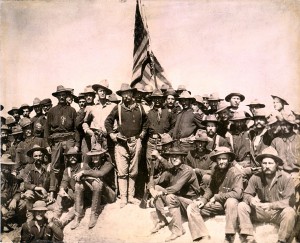 David Blight, a history professor at Yale University, is one of the nation’s leading experts on the Civil War and Reconstruction eras. This week, students in History 118 will be reading an article of Blight’s that appeared in the Journal of American History in 1989 and served as a precursor to his prize-winning book, Race and Reunion: The Civil War in American Memory (2001). The article, “‘For Something Beyond the Battlefield’: Frederick Douglass and the Struggle for the Memory of the Civil War,” offers a vivid portrait of an aging and angry Douglass fighting to preserve what he believed was the central legacy of the Civil War –the promise of emancipation. Douglass, a former runaway slave who became a great abolitionist orator and writer and the most famous black American of the nineteenth century, was distraught but still defiant over what he considered the betrayals of the “new birth of freedom” that occurred after the Civil War. Students who read the article carefully will learn a great deal about the nuances of the period and should be able to answer a series of key questions. For example, how did the great orator attempt to use the 1876 dedication of a Freedmen’s Memorial Monument to Abraham Lincoln to forge what Blight described as a place for blacks within the national identity? Why did Douglass claim that “the future historian will turn to the year 1883 to find the most flagrant example of national deterioration”? What exactly was Douglass fighting against during this period? How important in the contest over defining the war’s legacy was the movement known as “The Lost Cause”? Less than a year before he died, at the age of 76, Douglass sounded an especially poignant note in what became one of his famous Dedication Day speeches. “I shall never forget the difference,” he said, “between those who fought for liberty and those who fought for slavery; between those who fought to save the Republic and those who fought to destroy it.” His frustration was palpable and remains understandable but students should ask themselves how other Americans from that period, even those sympathetic to Douglass, might have reacted to such divisive commentary.
David Blight, a history professor at Yale University, is one of the nation’s leading experts on the Civil War and Reconstruction eras. This week, students in History 118 will be reading an article of Blight’s that appeared in the Journal of American History in 1989 and served as a precursor to his prize-winning book, Race and Reunion: The Civil War in American Memory (2001). The article, “‘For Something Beyond the Battlefield’: Frederick Douglass and the Struggle for the Memory of the Civil War,” offers a vivid portrait of an aging and angry Douglass fighting to preserve what he believed was the central legacy of the Civil War –the promise of emancipation. Douglass, a former runaway slave who became a great abolitionist orator and writer and the most famous black American of the nineteenth century, was distraught but still defiant over what he considered the betrayals of the “new birth of freedom” that occurred after the Civil War. Students who read the article carefully will learn a great deal about the nuances of the period and should be able to answer a series of key questions. For example, how did the great orator attempt to use the 1876 dedication of a Freedmen’s Memorial Monument to Abraham Lincoln to forge what Blight described as a place for blacks within the national identity? Why did Douglass claim that “the future historian will turn to the year 1883 to find the most flagrant example of national deterioration”? What exactly was Douglass fighting against during this period? How important in the contest over defining the war’s legacy was the movement known as “The Lost Cause”? Less than a year before he died, at the age of 76, Douglass sounded an especially poignant note in what became one of his famous Dedication Day speeches. “I shall never forget the difference,” he said, “between those who fought for liberty and those who fought for slavery; between those who fought to save the Republic and those who fought to destroy it.” His frustration was palpable and remains understandable but students should ask themselves how other Americans from that period, even those sympathetic to Douglass, might have reacted to such divisive commentary.
In March 2016, historian Eric Foner came to Dickinson to discuss these issues and their legacy for modern America at a special conference on Reconstruction hosted by the House Divided Project. Here are his short comments and here is a link to the video from the entire three-day gathering.

